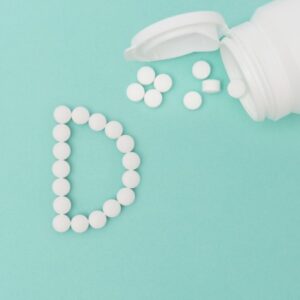Vitamin D, also called the “sunshine vitamin,” isn’t just for bone health. It is also an essential nutrient that helps support the immune system. In fact, studies have shown that Vitamin D lowers the risk of contracting viral upper respiratory infections, such as influenza and COVID-19, while limiting the severity of these infections.
Vitamin D and Respiratory Infections 
Vitamin D plays numerous important roles in the body — bone health, blood pressure, muscle function, etc. — but one of its key contributions is to the immune system. A global collaborative study has shown that Vitamin D supplementation can help the body combat acute respiratory infections responsible for millions of deaths each year. In this same study, researchers found that daily or weekly Vitamin D supplementation seems to most benefit those with levels less than 10 mg by cutting their chances of contracting the flu in half.
Numerous studies show direct relationships between Vitamin D deficiency and the severity of the COVID-19 virus. A recent study showed that 97% of all mild COVID-19 cases were in patients with Vitamin D levels above 30, and 98% of all severe cases had levels below 30. Vitamin D deficiency is believed to be implicated in severe COVID-19 infections for the hyper-immune response, including the so-called ‘cytokine storm.’ Vitamin D is believed to be consumed in the ‘cytokine storm,’ so people with marginal or low “normal” levels can quickly become deficient, hence the importance of monitoring Vitamin D levels.
Other studies suggest that:
- Overweight people generally need upwards of 30-40% more Vitamin D because it is fat-soluble. Therefore, the body levels are essentially diluted by increased body fat, limiting availability to support the immune defense.
- Non-white ethnicity and obesity are each independently associated with Vitamin D deficiency, which is one potential explanation for higher COVID-19 burden.
- Most clinical labs consider Vitamin D levels of 30 mg to be the lower normal limit. The wellness medical community has long recommended optimal levels of Vitamin D to be between 60 and 80. In reality, most people will have to take 5,000-10,000 IU per day to achieve these levels and should be monitored to ensure appropriate levels are achieved and maintained.
Prior to Dr. Anthony Fauci, Director of the NIH, announcing that he takes two supplements, Vitamin D and vitamin C, CardioMender, MD had already identified the benefits of these two supplements and included them in our Immune Defense Support Package.
Sunshine Vitamin
The most natural way we get Vitamin D is through sunlight. However, many individuals need to turn to supplements if they have a Vitamin D deficiency, which can occur for a number of reasons, including:
- Dark skin: The pigment melanin reduces the skin’s ability to produce Vitamin D in response to sunlight exposure.
- Obesity: Vitamin D is a fat-soluble vitamin which alters its release into the circulation. Individuals with a body mass index of 30 or great often have low blood levels of Vitamin D.
- Digestive Tract: Certain medical conditions, including Crohn’s disease, cystic fibrosis, and celiac disease, can affect the intestine’s ability to absorb Vitamin D from certain foods.
- Limited exposure to sunlight: The body makes Vitamin D when the skin is exposed to sunlight. Being homebound, living in northern latitudes, etc., may put you at risk of a Vitamin D deficiency.
Not everyone can get their daily dose of Vitamin D from the sun’s rays, especially when the days become shorter as we approach the winter season. Thus, to get enough Vitamin D, we often need to turn to foods and supplements.
The recommended daily value of Vitamin D for adults is 600-800 IU/day, but many people seem to require more to achieve normal Vitamin D levels. Healthy foods that are full of Vitamin D include:
- Salmon
- Herring and sardines
- Cod liver oil
- Canned tuna
- Egg yolks
- Mushrooms
There are also several ways to replace Vitamin D through supplementation. Preparations are either Vitamin D3 or Vitamin D2. Vitamin D3 is similar to the Vitamin D our body makes when exposed to the sun, while Vitamin D2 is a plant-based supplement.
It is important to note that while there are countless recorded benefits of Vitamin D, supplements of any kind are not intended to diagnose, treat, cure or prevent any disease. We advise everyone to consult with their healthcare professional prior to beginning any supplement regimen.
We value your health and wellness. Protect yourself from the upcoming flu season and ongoing COVID-19 presence with Doc’s Immune Defense Support Package to help maintain optimal natural immunity. Package includes one month’s supply.






